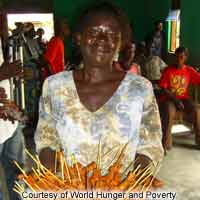World Hunger and Poverty

Project Information
Empowering families and communities to create self-help and sustainable solutions to food insecurity.
Describe the need affecting community
Approximately 842 million people are estimated to be suffering from food insecurity or chronic hunger, regularly not getting enough nutritious food to maintain a healthy and active life. Chronic hunger kills more people every year than AIDS, malaria and tuberculosis combined; in fact, poor nutrition contributes to 45% of deaths in children under five – 3.1 million children each year – and iron deficiencies cause 315,000 women to die from hemorrhaging during childbirth every year. Additionally, a lack of nutritious food can stunt growth, hinder fetal and mental development and negatively affect people’s productivity and sense of hope and overall well-being which traps people in poverty. 80% of food insecure people live in rural areas and the vast majority are either smallholder farmers (less than 5 acres) or are landless farmworkers. Small farmers are struggling to provide for their families in the face of land degradation, lack of access to water and seeds, land grabbing, gender inequity, and climate change.
How will this Advance project help to address the need?
Approximately 842 million people are estimated to be suffering from food insecurity or chronic hunger, regularly not getting enough nutritious food to maintain a healthy and active life. Chronic hunger kills more people every year than AIDS, malaria and tuberculosis combined; in fact, poor nutrition contributes to 45% of deaths in children under five – 3.1 million children each year – and iron deficiencies cause 315,000 women to die from hemorrhaging during childbirth every year. Additionally, a lack of nutritious food can stunt growth, hinder fetal and mental development and negatively affect people’s productivity and sense of hope and overall well-being which traps people in poverty. 80% of food insecure people live in rural areas and the vast majority are either smallholder farmers (less than 5 acres) or are landless farmworkers. Small farmers are struggling to provide for their families in the face of land degradation, lack of access to water and seeds, land grabbing, gender inequity, and climate change. UMCOR accompanies and empowers families and communities by providing access to the resources, training and technical support they need to increase and diversify their agricultural production enabling them to consume sufficient food to maintain a healthy and productive life and to sell excess to meet other needs like health care or education. By providing training in sustainable, organic methods, we build the capacity of farmers, pastoralists and fishermen to reverse the trend of poor land and water resource management and ensure the long term health and vitality of the resources on which they depend. Recognizing that the linkages between farming and improved family nutrition is very complex, UMCOR emphasizes a nutrition sensitive approach which seeks to strengthen the impact of agricultural projects by improving household health and nutrition behaviors.
Describe the primary goal of the project
(a) Provide funding, accompaniment and technical support to organizations empowering families to sustainably improve their food and nutrition security. (b) Develop resources and educational materials to educate and raise awareness within the faith based community about the issues faced by people who are poor and food insecure and call people to action to mobilize for ending the systemic injustices of hunger and poverty in the world.
Contact Information
Roland Fernandes
RFernandes@umcmission.org

